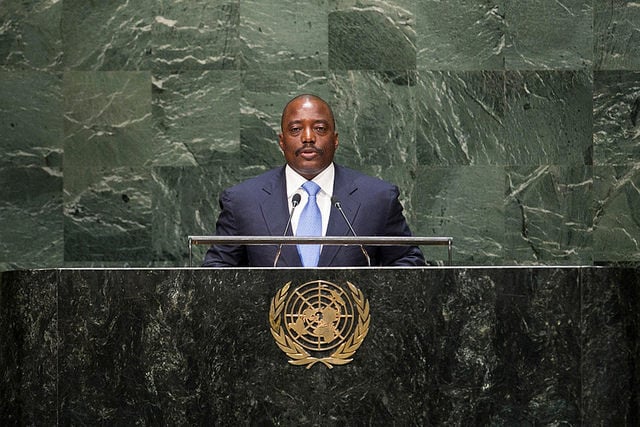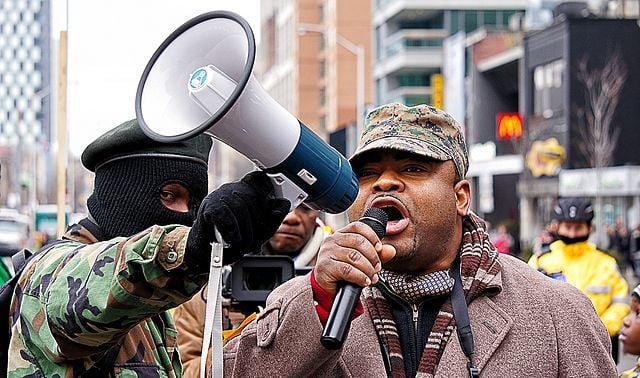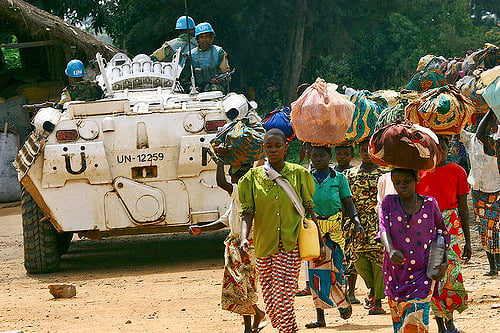
DRC president Joseph Kabila speaking at the United Nations in New York. (MONUSCO Photos)
For the second time in 16 years, the United States is preparing to inaugurate a president-elect who has lost the popular vote. While his opponents are organizing a number of dubious recounts in Midwestern states, his own supporters retort by spreading untruths about massive amounts of voter fraud in California. The president-elect himself is under fire for unprecedented conflicts of interest. And then there are strong suggestions that a foreign power meddled in the election process, possibly tipping the scales in favor of its preferred candidate.
Meanwhile, in Ghana, a majority of voters cast their votes for the candidate who proceeded to win the election. The current office holder promptly conceded. This marks the seventh peaceful political transition in a row in the West African country. Of course, democracy has long since ceased to be the province of America alone. In Africa, Ghana is perhaps the best example.
Alas, for every Ghana, there is a Democratic Republic of Congo. The DRC is a paradigm of the kind of state that people often associate with the African continent: weak governance, instability, violence, and a trend towards autocratic rule. However, current president Joseph Kabila had an opportunity to make history. Constitutionally barred from running for a third term, Kabila could have set a precedent by handing over power peacefully. He instead chose to do the opposite.
In the late 1990s, his father Laurent Kabila wrestled control over the DRC from long-time dictator and connoisseur of hats Mobutu. Upon Laurent’s death, Joseph was handed the reigns and then went on to win the presidential elections in 2006. These were widely regarded free and fair. However, inconsistencies and allegations of fraud marred his re-election bid in 2011, and his rule has become increasingly autocratic ever since.

Members of the Congolese community in Toronto protest the 2012 election results in the DRC, in which President Joseph Kabila was named the winner (Wikimedia)
According to the DRC’s constitutional rules, presidential elections were supposed to take place in November. Kabila and his supporters have argued that logistical and budgetary constraints have made this impossible. While there may be some merit to these concerns, these are clearly strawman arguments.
The constitution bars Kabila from running for a third term. He is wildly unpopular in the country, as fewer than 10% of Congolese want him to remain in power. He and his allies are trying to protect the economic and political gains they have amassed over the past 15 years in power. Kabila himself appears to have little to no interest in leaving the DRC for a position as an elder statesman in the mold of former Nigerian president Olusegun Obasanjo. In his mid-40s, he is still young. There is also a sense that his camp has safety concerns. They fear that handing over power to the opposition will lead to prosecutions.
Kabila’s solution has been to drag his feet on organizing elections. He now wants to delay them until 2018. Protests have been met with violent repression. In September, security forces reportedly killed more than 50 people over two days. While the opposition is vocal, it is also weak and disorganized. Meanwhile, the international community has been slow to respond. All the ingredients for the outbreak of major conflict are there.
What happens in the DRC has never been limited to a domestic political issue. Over the past two decades, conflict and instability in the country have tended to pull in both neighboring countries and those further afield. For reasons ranging from security concerns to maintaining resource access, various states have involved themselves in counterproductive ways by funding rebel groups and sending military troops. In particular, Rwanda and Uganda have repeatedly meddled in Congolese affairs, helping to destabilize the DRC in the process. Renewed outbreak of tensions will therefore make it more likely that Congo’s neighbors will once again intervene, which could have implications for regional stability and development.
The situation in the DRC takes place in a context in which several African leaders have recently tried to circumvent constitutional rules on term limits. Examples include neighbors Rwanda, Burundi, and the Republic of Congo. In Uganda, Yoweri Museveni has held on to power for 30 years. These autocrats will be emboldened by Kabila’s desperate attempt to cling on to the presidency.
Lastly, as the site of the most expensive peacekeeping operation in UN history, the DRC could be among the first tests for incoming UN Secretary-General António Guterres. With no end in sight in the Syrian civil war, and a U.S. president-elect likely disinterested in supporting UN missions, there is potential for the international community to turn a blind eye to what is going on in the DRC. While the MONUSCO mission is supersized by UN standards, it is already struggling to maintain order as it is. Already, the eastern provinces of the country are among the largest sources of refugees and internally displaced people worldwide. As the long-time head of UNHCR, Guterres may find himself in familiar territory sooner rather than later.

UN peacekeepers shortly before the 2006 presidential elections (United Nations Photo)
The reasons for instability in the DRC are varied and complex. The worst kind of colonial rule under Belgium, Cold War meddling by the United States and the Soviet Union, and some thirty years of Mobutu have left the country in ruins. It is barely a state. It ranks 147th in Transparency International’s Corruption Perceptions Index, 184th in the World Bank’s Ease of Doing Business Index, and 176th in the UN Human Development Index.
Now, Joseph Kabila is pouring oil into the fire. While the U.S. will probably survive Donald Trump’s autocratic tendencies, Kabila’s might be the final straw for the DRC.